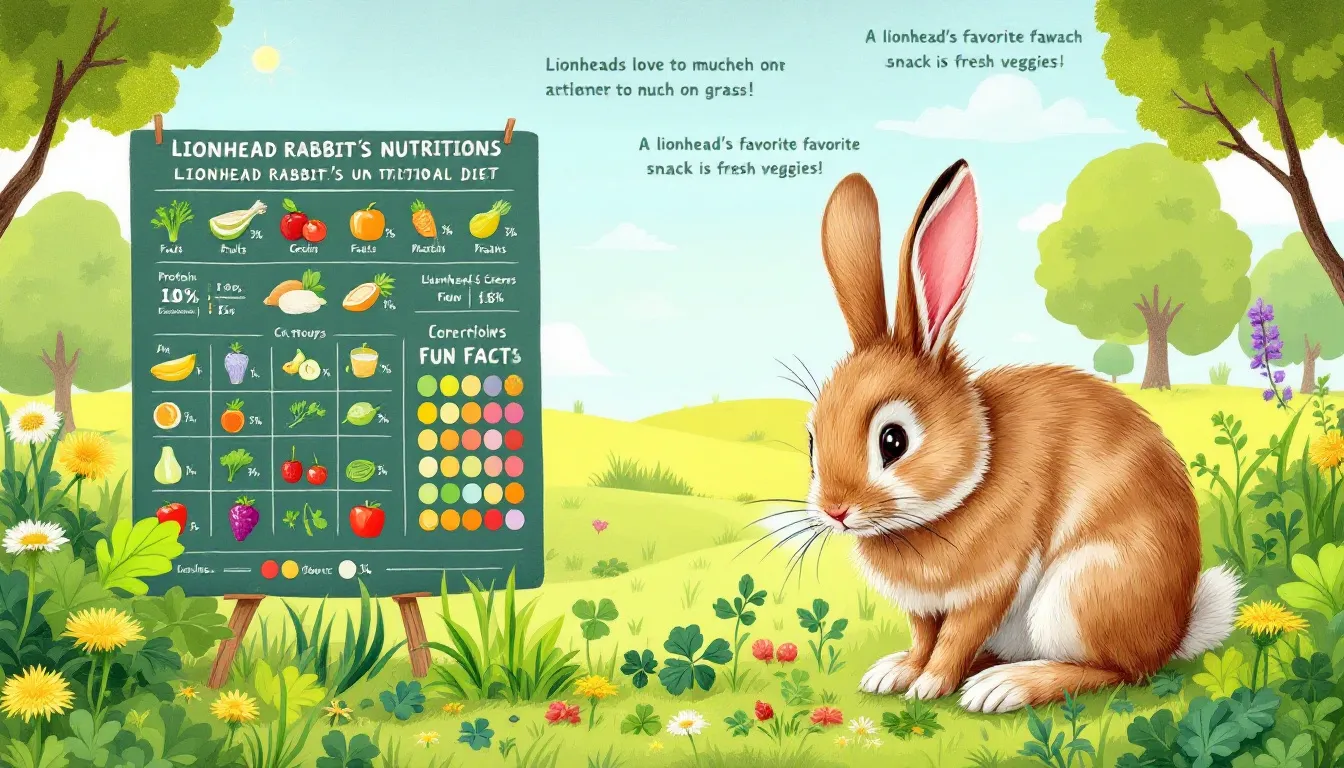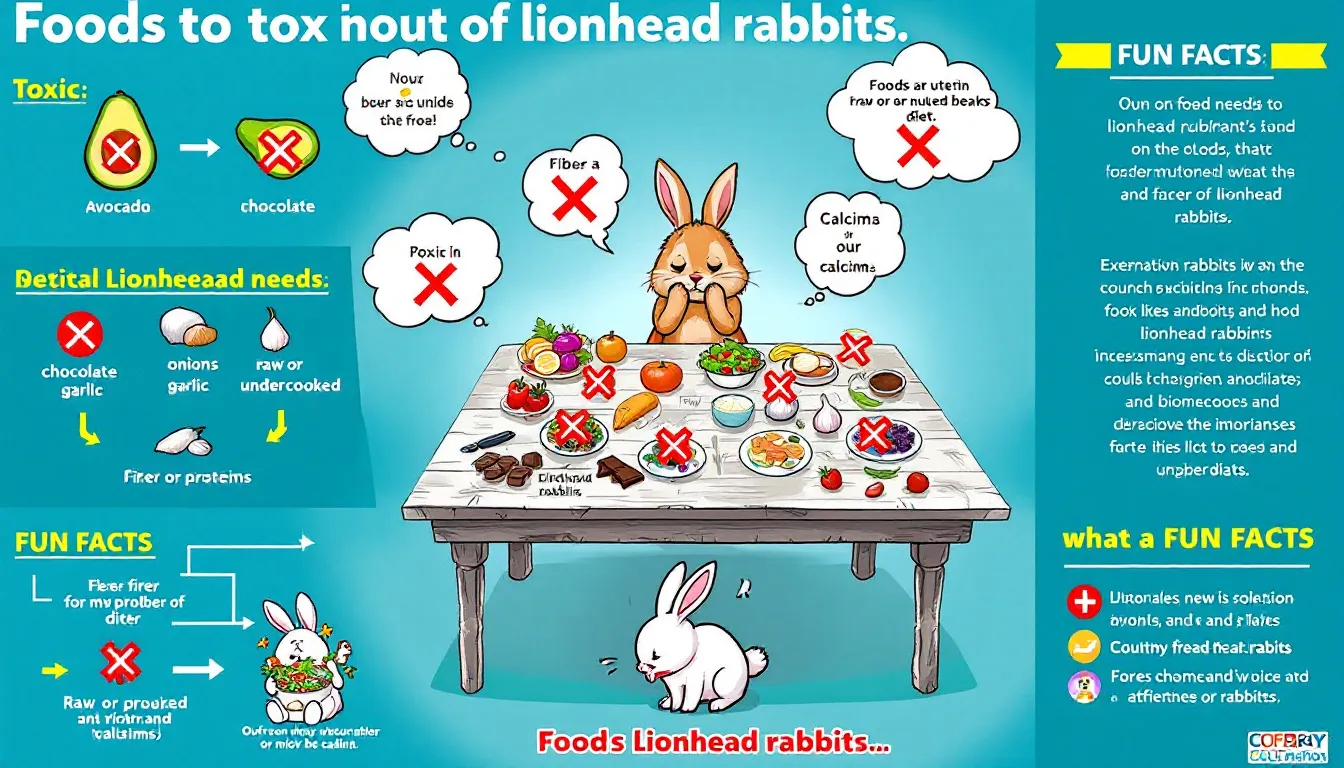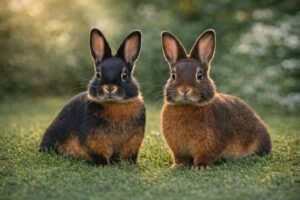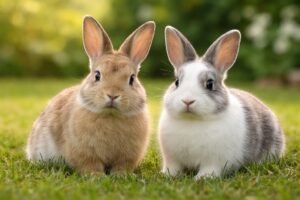Ensuring your lionhead rabbit has a proper diet is crucial for its digestive health and overall well-being. A lionhead rabbit diet should mainly consist of high-fiber hay, fresh vegetables, and small amounts of pellets. Fresh hay and grass should form the majority of their diet. Proper dental care is also essential, especially for their back teeth, to prevent overgrowth and sharp enamel points that can cause pain and difficulty in chewing. This guide will go into detail about what to feed your rabbit and why it’s important.
Daily interaction is equally important for lionhead rabbits, as they thrive on attention and affection from their owners.
Introduction to Lionhead Rabbits
Lionhead rabbits are a popular and adorable breed of rabbit known for their distinctive mane of fur around their head, giving them a lion-like appearance. They are a result of breeding a Swiss Fox rabbit with a Netherland Dwarf rabbit, which led to a genetic mutation known as the “mane gene.” This mutation causes long, woolly fur to grow specifically around the rabbit’s head. Lionhead rabbits are friendly and outgoing, and they are excellent pets for those who are willing to provide proper care and attention. Their playful and affectionate nature makes them a joy to have around, and they can form close bonds with their owners. With their unique look and charming personality, Lionhead rabbits are sure to win the hearts of rabbit enthusiasts everywhere.
Characteristics of Lionhead Rabbits
Lionhead rabbits are small in size, weighing between 2.5 and 3.75 pounds and measuring 8-10 inches in length. They have a compact body, short ears, and a high head mount. Their thick manes require regular grooming to prevent matting and tangling. Lionhead rabbits come in two varieties: single-maned and double-maned. Single-maned Lionheads are born with a mane that encircles their head, but it often becomes thinner and may diminish as they mature. In contrast, double-maned Lionheads maintain their lush, thick mane for life, and they may also develop longer fur around their flanks and back legs. This longer fur adds to their unique and charming appearance, but it also means they need more grooming to keep their coat in good condition. Regular grooming is essential to prevent matting and to keep their fur looking its best.
Key Takeaways
-
A lionhead rabbit’s diet should primarily consist of hay (85-90%), supplemented with fresh vegetables and limited pellets to ensure digestive health and prevent dental issues.
-
Treats should be offered sparingly, with high-sugar and processed foods avoided, to maintain optimal health and prevent digestive problems in lionhead rabbits.
-
Access to fresh water is essential for hydration, and proper environmental conditions, such as spacious cages and regular grooming, contribute significantly to the overall well-being of lionhead rabbits.
Understanding the Natural Diet of Lionhead Rabbits

In the wild, rabbits forage on a variety of plants, including grasses, weeds, and wildflowers, which are rich in fiber. This natural diet is crucial for maintaining your rabbit’s digestive system health and should serve as the model for feeding your lionhead rabbit. High-fiber foods are essential in preventing digestive issues such as gastrointestinal stasis, a potentially life-threatening condition for rabbits.
Providing a varied diet that mimics what lionhead rabbits eat in the wild can significantly enhance their vitality and overall well-being. Offering a variety of natural foods ensures your lionhead bunny receives the necessary nutrients to thrive. Understanding these dietary needs is the first step in ensuring your pet’s health and happiness.
Essential Components of a Lionhead Rabbit’s Diet

Proper nutrition is the cornerstone of a healthy and happy lionhead rabbit. Their diet should include three main components: hay, fresh vegetables and leafy greens, and pellets. Each of these elements plays a crucial role in maintaining the rabbit’s digestive health, dental health, and overall vitality.
A high-fiber diet is particularly important for preventing digestive issues and hairballs, which are common in lionhead rabbits.
Hay: The Foundation of a Healthy Diet
Hay should constitute 85-90% of a lionhead rabbit’s diet to ensure proper digestive health. Providing unlimited hay daily not only helps in managing dental issues but also prevents tooth overgrowth, which is a common problem in rabbits. Each lionhead rabbit should eat its body weight in hay every day. Fresh Timothy hay is the recommended type of hay for lionhead rabbits, but other varieties like British Meadow Feeding Hay and sweet-smelling hay with hedgerow herbs are also excellent choices.
Ensuring your lionhead rabbit has a high-fiber diet, particularly from hay, is crucial in mitigating the risk of gastrointestinal stasis. Additionally, providing plenty of hay and chew toys can prevent health issues related to their teeth, making hay an indispensable part of their diet.
Fresh Vegetables and Leafy Greens
Incorporating fresh vegetables and leafy greens, such as romaine lettuce, into your lionhead rabbit’s diet is essential for their overall health and well-being. Leafy greens like broccoli, fennel, and kale can be included daily to add variety to their diet. A general guideline is to feed 1 cup of greens per 2 pounds of body weight each day.
Maintaining a clean feeding environment by removing uneaten fresh foods after a few hours prevents harmful bacteria growth and keeps your lionhead bunny’s diet fresh and nutritious.
Pellets: Nutritional Support
Hay and fresh vegetables form the bulk of a lionhead rabbit’s diet, while rabbit pellets provide essential vitamins and minerals. Limiting pellets to about 1/8 cup daily for adults prevents dietary imbalances.
Pellets, high in fiber, should not dominate the diet. A small amount, around one egg cup per day, provides necessary nutrients without too many pellets. A lionhead rabbit should be given a small amount of high-fiber rabbit pellets daily to support their nutritional needs.
Occasional Treats for Lionhead Rabbits

Treats can be a delightful addition to your lionhead rabbit’s diet, but they should be offered sparingly to avoid health problems. High-fat and high-sugar treats can cause digestive issues and should be avoided. Instead, occasional small amounts of fruit like strawberries or apple slices can be included as treats.
Certain fruits, such as bananas and grapes, should be given only in limited quantities due to their high sugar content. Offering treats in moderation ensures your lionhead bunny enjoys a varied diet without compromising their health.
Foods to Avoid Feeding Your Lionhead Rabbit

Certain foods can be harmful to lionhead rabbits and should be avoided to ensure their health. Iceberg lettuce, for instance, can cause digestive issues and should not be included in their diet. High sugar fruits like bananas and grapes should also be limited. Feeding your lionhead rabbit iceberg lettuce is not advisable because it lacks nutritional value.
Processed foods such as bread, crackers, and cereals are harmful and should be excluded from their diet. It’s a common misconception that carrots can be a daily food item; they should only be offered as occasional treats. Carrots should only be offered as an occasional treat to lionhead rabbits to avoid excessive sugar intake.
Sticking to a few safe treats like parsley, dandelions, and carrot tops, offered sparingly, can help maintain a consistent and healthy diet for your rabbit, with the occasional treat.
Importance of Fresh Water

Access to fresh water is crucial for keeping lionhead rabbits hydrated and healthy. Signs of dehydration in rabbits include fewer droppings, darker urine, and lethargy. Refreshing their water daily prevents bacterial growth.
Providing both a water bowl and bottle allows rabbits to choose their preferred drinking method. In hot weather, they may drink more to regulate body temperature. Proper hydration helps maintain digestive function and reduces hairball formation.
Common Health Issues
Lionhead rabbits are prone to several health issues, including dental problems, digestive issues, and skin issues. Dental problems can occur if their teeth become overgrown, which can be prevented by providing plenty of hay and chew toys to keep their teeth trimmed. Digestive issues can arise if they eat too many pellets or do not have access to fresh water and a healthy diet. Skin issues can occur if their fur becomes matted or tangled, which can be prevented by regular grooming. It is essential to provide proper care and attention to prevent these health issues and ensure your Lionhead rabbit lives a long and healthy life. Regular veterinary check-ups can help catch any potential problems early, ensuring your rabbit stays in the best possible health.
Dental Care
Dental care is crucial for Lionhead rabbits, as they are prone to dental problems. Their teeth grow continuously throughout their life, and if they do not have enough opportunities to chew and trim their teeth, they can become overgrown. This can lead to health issues such as difficulty eating, weight loss, and even death. To prevent dental problems, provide your Lionhead rabbit with plenty of hay, such as Timothy hay, and chew toys to keep their teeth trimmed. Avoid giving them too many pellets, as this can lead to digestive issues and contribute to dental problems. Regular veterinary check-ups can also help identify any dental issues early on, and your vet can trim their teeth if necessary. By providing proper dental care, you can help ensure your Lionhead rabbit lives a long and healthy life. Regularly monitoring their eating habits and checking their teeth can also help you catch any issues before they become serious.
Dietary Tips for Special Conditions
Lionhead rabbits are prone to common health issues, particularly dental problems and digestive issues. Do lionhead rabbits experience malocclusion, a dental condition due to jaw misalignment, that can necessitate dietary adjustments? Pet insurance is recommended for lionhead rabbits because they tend to develop dental and digestive issues.
GI stasis is a serious gastrointestinal disease that can be life-threatening if not addressed with proper dietary measures. Including plenty of hay in the diet is essential to help prevent this condition.
Being mindful of these special conditions ensures your lionhead rabbit is treated with the proper care and nutrition they need.
Transitioning to a New Diet
Transitioning your lionhead rabbit to a new diet should be gradual to prevent digestive issues. Start by mixing a small amount of new food with their current diet and gradually increasing the proportion over 14-28 days.
Avoiding sudden dietary changes is crucial to prevent serious health problems. Following these steps ensures a calm handling transition and maintains your rabbit’s health and well-being, as a general rule.
Housing and Environmental Enrichment
Lionhead rabbits should have a cage size that is at least 18 inches by 24 inches and tall enough for them to stand on their hind legs without touching the top. Cages with wire bottoms should be avoided as they can injure a rabbit’s feet. Enclosures for Lionhead rabbits should have solid floors to prevent foot irritation. Rabbits need at least four hours of supervised exercise outside their enclosure each day.
Chew toys promote dental health in lionhead rabbits. Keeping the living area free from drafts ensures their comfort of all animals.
Creating a safe and enriching environment supports your rabbit’s overall health and happiness because multiple rabbits love such spaces, making them feel safe as a good pet. Lionhead rabbits thrive in the company of other rabbits and are very social animals, benefiting greatly from companionship.
Regular Grooming and Its Impact on Diet
Regular grooming is essential for maintaining a lionhead rabbit’s overall health. Daily grooming minimizes hairball risk by reducing fur ingestion. Lionhead rabbits require regular grooming due to their thick manes. Regular brushing prevents hairball obstructions and promotes proper digestion.
Lionhead rabbits should be groomed two to three times a week, and daily during shedding season. Excessive grooming or stress can lead to increased hair ingestion, raising the risk of gastrointestinal issues. Maintaining a regular grooming routine ensures your lionhead rabbit stays healthy and happy. They should also be brushed two to three times a week to prevent matting.
Summary
In summary, providing a well-balanced diet for your lionhead rabbit is essential for their health and happiness. This includes a foundation of hay, supplemented with fresh vegetables, limited pellets, and occasional treats. Ensuring access to fresh water, proper housing, and regular grooming is also a crucial component of their care. Lionhead rabbits generally live for 7 to 10 years with proper care. By following these guidelines, you can ensure that your lionhead rabbit thrives.
Frequently Asked Questions
How much hay should I feed my lionhead rabbit daily?
To ensure proper digestive health, you should provide your lionhead rabbit with unlimited amounts of hay daily, which should make up 85-90% of their diet. It is crucial that a rabbit eats its weight in hay every day to maintain a balanced diet and support their digestive system.
Can I feed my lionhead rabbit iceberg lettuce?
Feeding your lionhead rabbit iceberg lettuce is not advisable due to its potential to cause digestive issues. Iceberg lettuce can be particularly harmful to a rabbit’s digestive system, which is delicate and requires careful transitions between different foods. It is best to choose more suitable leafy greens for their diet.
How often should I groom my lionhead rabbit?
To ensure the health and well-being of your lionhead rabbit, it is advisable to groom them two to three times a week, with daily grooming during shedding season. Lionhead bunnies, in particular, require regular grooming to maintain their distinctive mane and prevent matting. Regular grooming will help prevent hairballs and support proper digestion.
What are the signs of dehydration in lionhead rabbits?
Signs of dehydration in lionhead rabbits include fewer droppings, darker urine, and lethargy. Ensuring access to fresh water daily is essential to prevent these issues. Additionally, providing a comfortable living environment with solid flooring is crucial to prevent injuries and irritation to the rabbit’s feet.
How can I transition my lionhead rabbit to a new diet?
To successfully transition your lionhead rabbit to a new diet, gradually introduce the new food by mixing it with their current diet over a period of 14 to 28 days to avoid digestive problems. This approach ensures a smooth adaptation to the dietary change. Additionally, consider other factors such as the rabbit’s age, health, and individual preferences, as these can also impact how well they adjust to the new diet.



